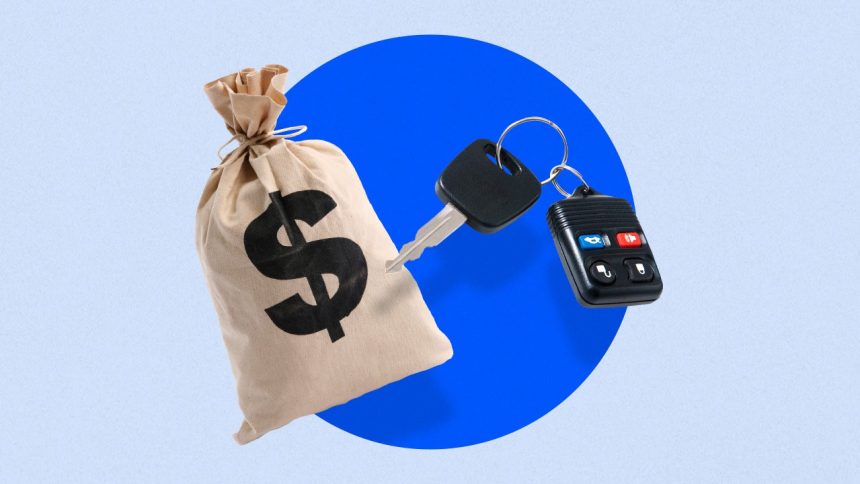Key takeaways
- Financing the cost of your vehicle with an auto loan can make vehicle ownership more accessible.
- Most auto loans tend to be secured, meaning the vehicle is collateral. Unsecured loans are personal loans that can be used for a vehicle purchase.
- Auto loans can be found through the dealership where you intend to purchase or through credit unions, traditional banks or credit unions.
Whether you are in the market to buy a new car or looking to refinance an existing loan, there are different types of car loans available. The most common options include secured and unsecured auto loans, but there are also buy-here-pay-here loans, private party auto loans and lease buyout loans.
Make sure you understand the differences between the various types of auto loans so you can choose one that best suits your needs and financial goals.
Secured vs. unsecured auto loans
Secured auto loans
Most auto loans are secured. Secured loans use an asset of value as collateral to reduce the risk to the lender.
Secured car loans typically use the car itself as that collateral. If you apply for a secured loan, you may have better approval odds and a more attractive interest rate, as the lender can repossess the vehicle if you default.
Pros
- Larger loan amounts.
- Easier to qualify.
- Potentially lower interest rates.
Cons
- Less flexibility.
- Used vehicle restrictions.
- Repossession possible.
Unsecured auto loans
Unsecured auto loans are personal loans used to purchase a new or used car. They often have stricter eligibility guidelines and higher interest rates since collateral isn’t required. To qualify, you’ll generally need a solid credit score and payment history, along with a steady and verifiable source of income.
Pros
- More flexibility.
- It can be an easier process.
- Ability to secure funding before choosing a vehicle.
Cons
- Increased potential for legal issues.
- Higher interest rates.
- Loan amounts can be smaller.
Car purchase loans
Car purchase loans are available through traditional banks, credit unions and online lenders. Or you can use dealer financing to make the process more seamless. You can typically expect higher financing costs at a dealership, though you might be able to negotiate or qualify for a financing deal.
The amount you qualify for depends on the type of loan you’re seeking — a new or used car loan — and the details of your personal finances. Each lender has its own set of guidelines, usually based on credit history.
Both new and used auto loans typically come with repayment periods between three and five years, but some lenders offer loan terms of up to 84 or even 96 months.
Depending on the financing arrangement, you may also be required to make a down payment. Financial experts suggest you put at least 20 percent down, but it’s best to pay what you can comfortably afford.
Bankrate tip
Your loan amount, interest rate and repayment period determine your monthly payment. Use an auto loan calculator to get an estimate of your monthly payment.
Buy-here, pay-here loans
Also known as second-chance car loans, buy-here, pay-here loans are a type of dealership financing for poor credit borrowers. This is a last resort option. These loans come with sky-high rates and a high monthly payment. The lot may even insist on installing a GPS tracker or starter interrupter as a condition of approval.
Instead, shop for bad credit auto loans for a chance of approval with a lower cost.
Bankrate tip
Be wary of any deal that sounds too good to be true. Buy-here, pay-here lots are notorious for yo-yo scams that can result in future financial problems.
Private party auto loans
A private party auto loan is a loan taken out specifically for purchasing a car owned by a private party. Banks, credit unions and online lenders offer this type of loan. Rates tend to be slightly higher than if you were buying a car from a dealership.
Lease buyout loans
A lease buyout loan lets you keep your leased vehicle once the contract ends. You can use it to finance the purchase of the vehicle, which is stated in the lease agreement.
Your monthly payment could be higher than your lease payments since lease payments only cover the cost associated with the vehicle’s depreciation during the lease term. A lease buyout loan, on the other hand, is calculated based on the total purchase amount of the car. After the final payment is made, the car is yours to keep.
Auto refinance loans
An auto refinance loan lets you swap out your current loan for a new one.
Refinancing your auto loan is often used to get a more affordable rate or extend your loan term to lower your monthly payment. You can also refinance to reduce your loan term and pay your loan off faster.
This type of auto loan could be a smart financial move for a few reasons. If market rates have dropped since you took out your current loan, it’s worth checking if a better rate is available. You may also qualify for a better deal if your credit score is higher than when you initially applied or if you used dealer financing and didn’t get the best rate.
Bankrate tip
You’ll need a credit score of 670 or above for the best rates. If your credit is less than ideal, you might consider other options, such as selling your car to pay off your loan.
Cash-out auto refinance loans
A cash-out refinance loan is similar to traditional refinancing but lets you convert your car’s equity, or the difference between the value and what you owe, into cash. You’ll replace your current loan with a new one that includes the equity you borrowed.
The amount of cash you can withdraw is generally limited to the equity you have in your vehicle. Still, this loan could be beneficial if you need fast cash.
Keep in mind that increasing the principal typically means you’ll pay more in interest over the life of the loan. Also, not all lenders offer cash-out auto refinance loans, so you’ll need to do some legwork to find a lender who can lend a helping hand. Lastly, remember that increasing the amount you owe puts you at greater risk of going upside-down.
Other auto loan variations
The above auto loan types also vary based on how interest is computed, where you get the loan and whether the loan is secured by collateral.
Simple interest loans vs. precomputed interest auto loans
Auto loans can have two types of interest: Simple interest or precomputed.
Simple interest loans are much more common. They calculate the interest paid each month based on the current principal balance. As your principal balance shrinks, so will the amount of interest you owe on each payment. So, if you pay more than the minimum each month, you can save a bundle in interest and pay the loan off early.
You’ll typically find precomputed interest loans from lenders that work with bad-credit buyers. Precomputed interest loans have the loan balance, origination fees and interest calculated at the beginning and divided across the loan term according to a formula called the rule of 78.
If you pay the minimum each month over the loan term, there is little difference between a simple interest loan and precomputed interest loan.
However, if you plan to pay the loan off early or make larger payments, a precomputed interest loan will not save you money since interest for the entire loan term is already factored into the monthly payment amount.
Direct auto financing vs. indirect auto financing
Direct financing is when you obtain auto financing through a lender outside the dealership. Getting approved or preapproved for an auto loan with a lender before heading to the dealership can give you more bargaining power during negotiations.
You will know how much you’re eligible to borrow, along with the interest rate and loan term you qualify for. With this information handy, you can take the guesswork out of the car shopping process by knowing exactly how big of a budget you have.
When you’re ready to seal the deal, the dealer verifies the information and completes the transaction. Or, you can use the offer you’ve received to negotiate a better deal on financing with the dealer.
With indirect financing, the dealer offers its own financing through its lending partners. You work with the dealer to fill out your auto loan application, which the dealer then sends to a lender or lenders.
While indirect financing can be convenient, the dealer may mark up the interest rate to ensure they profit. And there’s no way to know if you’re getting the best deal since the dealer handles the financing process from start to finish.
Which car loan is best?
Auto loans share similarities, but there are key differences to remember when deciding which is best for you and your needs. The best option will depend on your goal for the loan — whether replacing your current loan, buying a new car at a dealership, or something else.
Before deciding which type of car loan is best, make sure you understand how to prepare for the application process. Also, compare auto loan rates to find the best lenders and get preapproved to ensure you score a competitive financing offer.
Read the full article here














